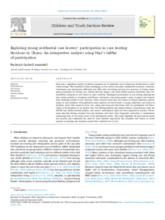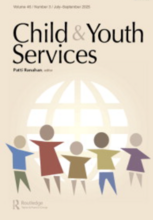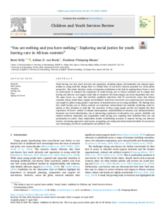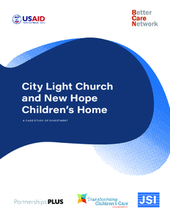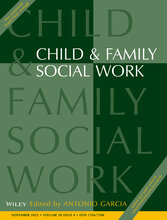This country page features an interactive, icon-based data dashboard providing a national-level overview of the status of children’s care and care reform efforts (a “Country Care Snapshot”), along with a list of resources and organizations in the country.
demographic_data
childrens_living_arrangement
children_living_without_bio
adoption
social_work_force
key_stakeholders
Key Stakeholders
Add New DataOther Relevant Reforms
Add New Datadrivers_of_institutionalisation
Drivers of Institutionaliziation
Add New Datakey_research_and_information
Key Data Sources
Add New DataCare Reform Roadmap in Ghana (2024-2028)
The Way Forward Project Report
Street Children in Accra: A Survey Report
A Situation Analysis of Ghanaian Children and Women: A Call for Reducing Disparities and Improving Equity
Country Care Review: Ghana
The Children's Act of Ghana, 1998
Prevalence and number of children living in institutional care: global, regional, and country estimates
Experiences of Children in Kinship Care (CKC) in Ghana: Challenges for Cultural Practices
Multi-Dimensional Child Poverty in Ghana
Child and Family Welfare Policy: Ghana
Acknowledgements
Data for this country care snapshot was contributed by partners at UNICEF Ghana.
Displaying 1 - 10 of 205
This article describes how, in Ghana, government officials report that more than 60,000 children are currently living and working on the streets of major urban centres, a situation described as a national emergency due to its links with deepening child poverty and multidimensional deprivation.
This qualitative study examines how young care leavers in Ghana are involved in decisions about their transition from residential care, revealing that despite national and international policy commitments, their participatory rights are often neglected. Findings show that care leavers frequently feel excluded or manipulated in key decisions, highlighting the need for more inclusive, rights-based approaches that recognize them as active partners in planning their post-care futures.
Street-connected children in Ghana face systemic marginalization, requiring comprehensive interventions at the family, community, and policy levels. Based on insights from 12 social workers, this study highlights micro-, mezzo-, and macro-level strategies to reduce the number of street-connected children and support their reintegration into society.
This article uses Nancy Fraser’s social justice framework to examine the experiences of youth leaving care in Ghana, South Africa, Uganda, and Zimbabwe, drawing on interviews with 45 care-leavers conducted by peer researchers. Findings reveal how intersecting injustices—such as stigma, exclusion, and lack of resources—undermine their transition to adulthood, underscoring the need for stronger aftercare services, recognition of diverse identities, and greater youth participation in shaping policy and support.
In this workshop panelists explored UNICEF's Data and Analytics Section's protocols and tools for gathering data on children in residential care.
This case study documents the complex process undertaken by a donor partner in Ireland* to push for the transition of their partner residential care service provider in Ghana. It follows their journey through the early stages of transition and eventually leads to their decision to divest of their funding and partnership.
Ghana's Ministry of Gender, Children and Social Protection (MoGCSP) has launched the National Care Reform Roadmap (NCRR) 2024-2028.
The Care Reform Roadmap (2024-2028) lays out the strategic actions for caring for vulnerable children in Ghana, led by the Ministry of Gender, Children, and Social Protection.
The study's main themes were establishing the need for residential homes for children (RHCs), RHCs not being an ideal family environment and RHCs as respite. Family marital problems, poor financial situation, stigma attached to some children in care, abusive parents and a lack of suitable alternatives when families have a crisis were identified as key factors that impede DI implementation in Ghana.
This UNICEF ESARO webinar explores the role of case management in care reform and examines strategies for effective case management from Kenya, Ghana and Uganda.

